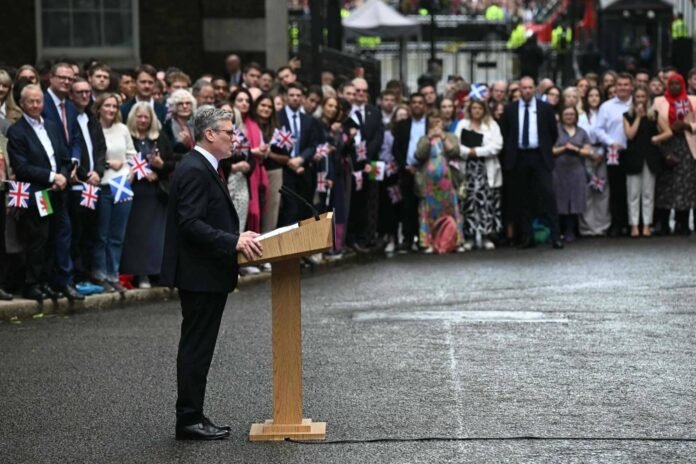With Britain’s centre-left Labour Party coming to power on Friday, it’s worth reflecting on what’s happening among its allies.
In neighboring France, the far-right Rassemblement National, which has attacked climate policy as part of its pitch to voters, is hoping to build on previous successes in the country’s final round of parliamentary elections on Sunday. In the United States, Republican President Donald Trump, who has denied climate science, is leading in the polls. Across Europe, an anti-green backlash has cowed climate ambition.
By contrast, Keir Starmer’s Labour Party has a manifesto that puts climate and clean energy at its heart, and Ed Miliband, a potential energy secretary with years of experience in climate diplomacy. While the UK has long led the way in climate progress — it has decarbonised faster than any other Group of Seven country — the incumbent Conservative Party has scaled back its once-lofty ambitions in the past year.
Among other green policy rollbacks, Prime Minister Rishi Sunak’s government postponed a ban on the sale of new petrol and diesel cars and backed new oil and gas drilling in the North Sea. Sunak saw an opportunity to appeal to voters who might have felt the green transition was moving too quickly.
Labour’s victory shows that approach did not work.
“The results seem clear: voters rejected the anti-net-zero rhetoric and opted for cheaper, cleaner, safer energy,” said Greg Jackson, founder and CEO of utility Octopus Energy. “This looks like a seismic shift for a green economy.”
Ahead of this year’s UK election, a Bloomberg analysis found that Tories are embracing greener lifestyles despite their party’s rejection of climate policies. Of the UK constituencies with the 100 largest domestic solar installations, for example, all but four voted Conservative in 2019, and many Tory areas also have very high electric vehicle adoption.
“The public has just given a huge climate vote of faith behind Labour’s ambitious policies, including clean energy by 2030, ending domestic oil and gas production and delivering a comprehensive Warm Homes Plan to fix our leaky homes,” said Juliet Phillips, programme lead for the energy team at E3G, a think tank.
Starmer’s party now faces a battle to actually implement that policy at a time when public finances are tight. And there are still many gaps and question marks over the plans. What exactly does it promise and what pitfalls stand in the way of success?
Labour’s most generous green proposal for households is a £13.2 billion ($16.9 billion) plan for energy efficiency upgrades in homes. This is double the previous government’s pledge and would include grants and low-interest loans for solar panels, batteries and home insulation.
Curiously, Labour’s plan makes no mention of subsidies for installing heat pumps — even though Miliband has said that current ones will be kept. The manifesto also promises that “no one will be forced to take out their boiler,” and Miliband has said that Labour will not honour a Conservative pledge to ban new gas boiler installations (with exceptions) from 2035.
Labour also plans to introduce better energy efficiency standards for private rented homes, a promise made by the previous government but later retracted.
What Britons probably most want to see become reality is Labour’s promise to cut energy prices. The new government could do this, Starmer says, by extending a windfall tax on oil and gas companies and using that money to fund “Great British Energy,” a proposed new energy company to support clean energy projects in the UK.
The idea is that this will reduce dependence on foreign natural gas and ultimately lower costs for consumers.
The name GB Energy sounds like a complete nationalisation of the energy sector, but it isn’t, because it will have only limited use of public money. Labour estimates that the windfall tax will raise £8.3 billion over the next five years, and that won’t be enough on its own. The UK’s independent adviser, the Climate Change Committee, estimates that Britain needs an additional investment of around £15 billion a year in clean energy over the next decade to largely decarbonise electricity generation by 2030 and fully decarbonise it by 2035.
“There is plenty of private finance that wants to invest in the energy transition,” said Josh Buckland, a former government energy adviser and now a partner at consultancy Flint Global. GB Energy “could play a really important role in terms of bringing the sector together,” as a central hub, “to make sure that the supply matches the ambitions that the new government has set,” he said.
For the average person in the country, GB Energy is unlikely to provide any immediate benefits. Although household energy bills have fallen recently, they are expected to rise again in the winter as global energy prices rise. There is little that can be done about that now.
There are even tougher challenges ahead. One of Labour’s toughest targets to implement is a “clean” electricity grid by 2030. Last year, around 33% of the UK’s electricity supply came from fossil fuels, most of it gas. Even if Labour manages to double onshore wind, triple solar and quadruple offshore wind, a baseload source of energy will still be needed to fill the gaps that arise when demand is high, the sun is low and the weather is still.
Labour’s manifesto attempts to address this intermittency problem by calling for more investment in hydrogen, as well as marine energy systems that rely on the predictability of tides. However, the new government would also support a “strategic reserve” of gas-fired power stations as a backup. These could theoretically be run cleanly using carbon capture and storage — which Labour has pledged to support — but that technology is far from commercially viable.
Still, Phillips said the plan should still be seen as a step in the right direction. “Whether it’s 100% renewables or a bit of gas backup, it would still be progress, which could hopefully inspire other countries around the world to go further and faster,” she said.



